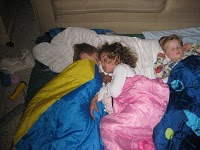Tonight is New Years Eve, and it’s also a good time to evaluate whether or not your child is ready for a sleepover. Last summer we entered into a new era of big kid play-dates. Forget playing for just a few hours, now those dates all end with, “Mommy Can She Sleep Over?” I’m not surprised, though. My daughter Emily, who is now seven, actually started having sleep-overs at the ripe age of four. I know, gasp! However we come from a large family (my children have over 20 cousins) so sleeping in the same room with other kids at a very young age has been impossibly unavoidable.
Emily’s first sleep-over (one that did not include cousins or family friends visiting from out of town) was with her best bud who lived a few houses down from us. We had known the family for years so we felt comfortable letting her go and we were pretty confident we wouldn’t get the middle-of-the night-call to come pick her up. So now, having seen how much fun Emily has on these sleep-overs, my three-year-old son and his best bud (also a neighbor) are asking to do the same. Trust me, it’s not happening anytime soon. But it begs the question: What age is a good age to start sleep-overs, and what do you do to ensure a successful night?
Like all parents, my husband and I set a few basic ground rules – and make sure we have a couple of staples on-hand – before the event begins. Of course we communicate a “lights out” time right off the bat, and we have a “wind-down” time established to ensure peace and quiet at some point. We don’t set rules on when they can get up in the morning, but that’s only because we let the girls either sleep in our basement playroom or in the guest room on the first floor. So, if they rise before us (which is pretty unlikely with a three-year-old in the house) they know enough to play quietly before we come down.
And while sleep-overs can be a lot of work in itself, I have to admit I’m not one to plan a special activity or craft. I’m all about letting the kids play together independently. But we always make sure to have plenty of popcorn and a couple of Red Box movies on-hand for the late night wind-down. And I also like to cook a special breakfast the next morning – one that usually involves chocolate chips and whipped cream (because we moms deserve a treat too, right?).
While writing this blog, I came across some great tips on Parenting.com on how to determine whether your child is ready for a sleep-over and things to consider before hosting the big event.
According to the web site, age alone doesn’t determine sleep-over readiness. And sometimes your child may say he is ready, but he’s not. Here are some signs to help you determine if the time has come:
READY
• Expresses unqualified enthusiasm (but be aware of zeal accompanied by trepidation).
• Has successfully “practiced” at a relative’s or a family friend’s.
• Sleeps at home without repeatedly asking for water or using other sleep-stalling tactics.
• Handles separation easily, whether parting for school or being left with a babysitter.
• Voices mild doubt that’s easily resolved — say, an issue of not knowing where the bathroom is.
NOT
• Needs elaborate bedtime rituals, such as three stories, a bedside lamp on, a door open, or a certain tape playing.
• Depends on middle-of-the-night comfort in your bed.
• Regularly wets the bed.
• Only wants to host a sleepover, not be a guest.
• Clings when you leave him, and seems averse to new experiences.
• Displays anxiety that the friend is a bully (or some other concrete sign of discomfort).
And when that big day does come, here are seven signs Parenting.com offers to ensure success:
1. Talk it over with your child. Discuss who — and how many — to invite, along with ideas for activities and food. For 5- and 6-year-olds, one guest is best; for older kids, more can be better, but keep the group small enough to easily supervise — six to eight kids, max.
2. Nail down the details. Invite the guest(s) well in advance, specifying the starting and ending times, and tell the parents what to bring (a sleeping bag, a stuffed animal, etc.). Offer younger kids the option of staying overnight or only for the evening.
3. Tell the parents what’s planned, including any videos and outside activities. Get a contact number if they’ll be out that night, and ask about their child’s food allergies or other important information.
4. Set limits. Tell children your house rules (no running, jumping, or screaming; where snacking is allowed; what’s off-limits) as you give a rundown of the fun that’s to come. Hint at a surprise or two. Let them know when lights-out will be (and give a ten-minute warning before it comes).
5. Keep ’em busy from the get-go. Have a simple crafts project ready, or get everyone dancing in the family room.
6. Feed them early and often. Serve a finger-food meal soon after guests arrive. Get them involved in the preparation: Do-it-yourself pizzas (using prebaked crusts and prepared toppings), subs, a taco bar, and fruit smoothies are all great options.
7. End with a flourish. Have an easy breakfast, such as juice and muffins. If everything clicks, try one last activity. Bring it to an early finish, at around 10 a.m.
I think we’ve been doing a pretty good job. How about you? How did you know your child was ready, and what special tricks do you have to share?
















